【课堂新坐标,同步备课参考】2013-2014学年高中英语外研版必修五教师用书Module 2 A Job Worth Doing
- 格式:doc
- 大小:6.12 MB
- 文档页数:49
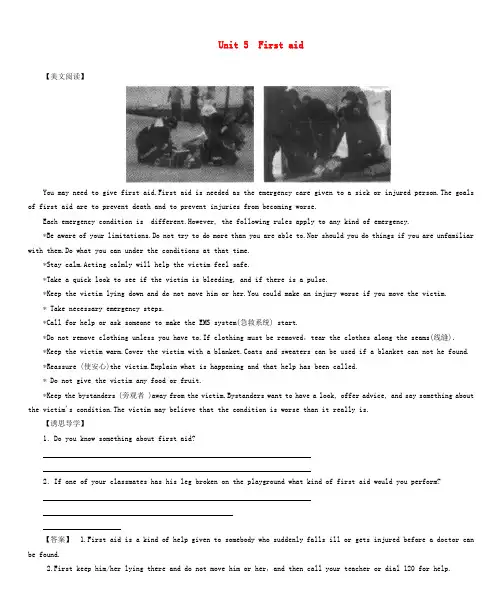
Unit 5 First aid【美文阅读】You may need to give first aid.First aid is needed as the emergency care given to a sick or injured person.The goals of first aid are to prevent death and to prevent injuries from becoming worse.Each emergency condition is different.However, the following rules apply to any kind of emergency.*Be aware of your limitations.Do not try to do more than you are able to.Nor should you do things if you are unfamiliar with them.Do what you can under the conditions at that time.*Stay calm.Acting calmly will help the victim feel safe.*Take a quick look to see if the victim is bleeding, and if there is a pulse.*Keep the victim lying down and do not move him or her.You could make an injury worse if you move the victim.* Take necessary emergency steps.*Call for help or ask someone to make the EMS system(急救系统) start.*Do not remove clothing unless you have to.If clothing must be removed,tear the clothes along the seams(线缝).*Keep the victim warm.Cover the victim with a blanket.Coats and sweaters can be used if a blanket can not he found.*Reassure (使安心)the victim.Explain what is happening and that help has been called.* Do not give the victim any food or fruit.*Keep the bystanders (旁观者 )away from the victim.Bystanders want to have a look, offer advice, and say something about the victim's condition.The victim may believe that the condition is worse than it really is.【诱思导学】1.Do you know something about first aid?2.If one of your classmates has his leg broken on the playground what kind of first aid would you perform?【答案】 1.First aid is a kind of help given to somebody who suddenly falls ill or gets injured before a doctor can be found.2.First keep him/her lying there and do not move him or her,and then call your teacher or dial 120 for help.Period ⅠPreviewing(教师用书独具)●教学目标初步掌握本课文中的词汇,浅层次理解课文,了解相关的背景知识。
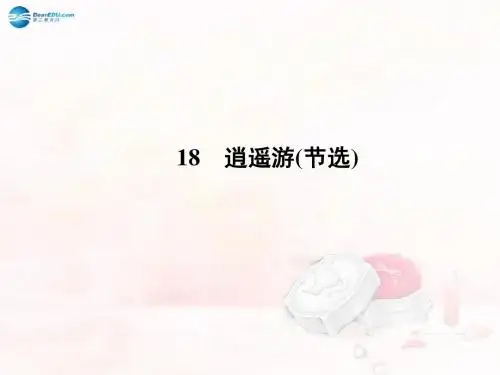
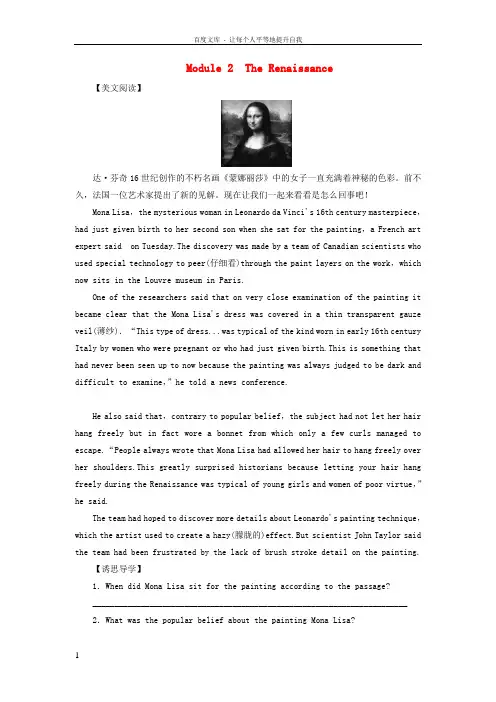
Module 2 The Renaissance【美文阅读】达·芬奇16世纪创作的不朽名画《蒙娜丽莎》中的女子一直充满着神秘的色彩。
前不久,法国一位艺术家提出了新的见解。
现在让我们一起来看看是怎么回事吧!Mona Lisa,the mysterious woman in Leonardo da Vinci's 16th century masterpiece,had just given birth to her second son when she sat for the painting,a French art expert said on Tuesday.The discovery was made by a team of Canadian scientists who used special technology to peer(仔细看)through the paint layers on the work,which now sits in the Louvre museum in Paris.One of the researchers said that on very close examination of the painting it became clear that the Mona Lisa's dress was covered in a thin transparent gauze veil(薄纱).“This type of dress...was typical of the kind worn in early 16t h century Italy by women who were pregnant or who had just given birth.This is something that had never been seen up to now because the painting was always judged to be dark and difficult to examine,”he told a news conference.He also said that,contrary to popular belief,the subject had not let her hair hang freely but in fact wore a bonnet from which only a few curls managed to escape.“People always wrote that Mona Lisa had allowed her hair to hang freely over her shoulders.This greatly surprised historians because letting your hair hang freely during the Renaissance was typical of young girls and women of poor virtue,”he said.The team had hoped to discover more details about Leonardo's painting technique,which the artist used to create a hazy(朦胧的)effect.But scientist John Taylor said the team had been frustrated by the lack of brush stroke detail on the painting.【诱思导学】1.When did Mona Lisa sit for the painting according to the passage?________________________________________________________________________ 2.What was the popular belief about the painting Mona Lisa?________________________________________________________________________ 【答案】 1.After she had just given birth to her second son. 2.Mona Lisa had allowed her hair to hang freely over her shoulders.Period ⅠPreviewing●教学目标本课时主要是通过学生对学案所给出的内容的学习,了解本课文中所出现的词汇,初步了解课文以及相关的背景知识,对下一堂课课文的全面理解起到一个铺垫作用。
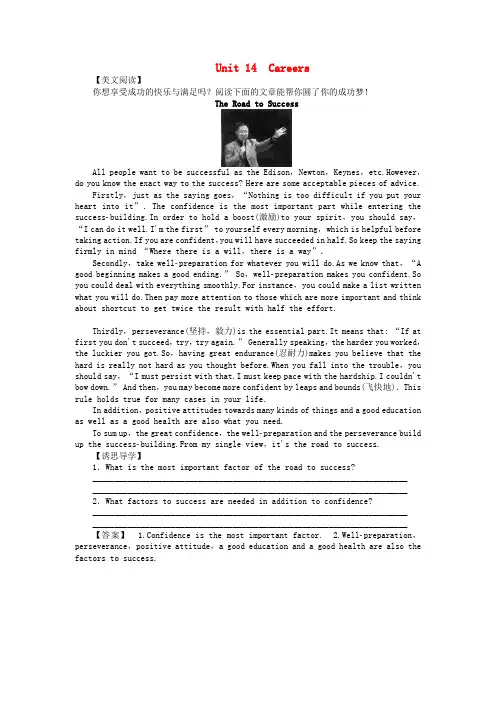
Unit 14 Careers【美文阅读】你想享受成功的快乐与满足吗?阅读下面的文章能帮你圆了你的成功梦!The Road to SuccessAll people want to be successful as the Edison,Newton,Keynes,etc.However,do you know the exact way to the success? Here are some acceptable pieces of advice.Firstly,just as the saying goes,“Nothing is too difficult if you put your heart into it”.The confidence is the most important part while entering the successbuilding.In order to hold a boost(激励)to your spirit,you should say,“I can do it well.I'm the first” to yourself every morning,which is helpful before taking action.If you are confident,you will have succeeded in half.So keep the saying firmly in mind “Where there is a will,there is a way”.Secondly,take wellpreparation for whatever you will d o.As we know that,“A good beginning makes a good ending.” So,wellpreparation makes you confident.So you could deal with everything smoothly.For instance,you could make a list written what you will do.Then pay more attention to those which are more important and think about shortcut to get twice the result with half the effort.Thirdly,perseverance(坚持,毅力)is the essential part.It means that: “If at first you don't succeed,try,try again.” Generally speaking,the harder you worked,the luckier you got.So,having great endurance(忍耐力)makes you believe that the hard is really not hard as you thought before.When you fall into the trouble,you should say,“I must persist with that.I must keep pace with the hardship.I couldn't bow down.” And then,you may become more confident by leaps and bounds(飞快地).This rule holds true for many cases in your life.In addition,positive attitudes towards many kinds of things and a good education as well as a good health are also what you need.To sum up,the great confidence,the wellprepa ration and the perseverance build up the successbuilding.From my single view,it's the road to success.【诱思导学】1.What is the most important factor of the road to success?________________________________________________________________________ ________________________________________________________________________ 2.What factors to success are needed in addition to confidence?________________________________________________________________________ ________________________________________________________________________ 【答案】 1.Confidence is the most important factor. 2.Wellpreparation,perseverance,positive attitude,a good education and a good health are also the factors to success.Period ⅠPreviewing(教师用书独具)●教学目标本课时主要是通过学生对学案所给出的内容的学习,了解本课文中所出现的词汇,初步了解课文以及相关的背景知识,对下一堂课课文的全面理解起到一个铺垫作用。
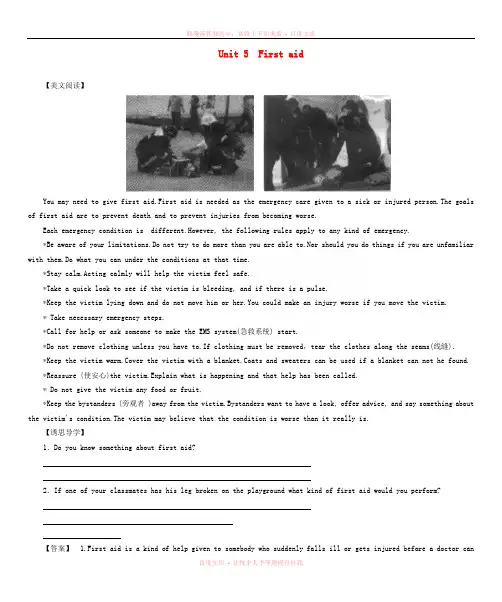
Unit 5 First aid【美文阅读】You may need to give first aid.First aid is needed as the emergency care given to a sick or injured person.The goals of first aid are to prevent death and to prevent injuries from becoming worse.Each emergency condition is different.However, the following rules apply to any kind of emergency.*Be aware of your limitations.Do not try to do more than you are able to.Nor should you do things if you are unfamiliar with them.Do what you can under the conditions at that time.*Stay calm.Acting calmly will help the victim feel safe.*Take a quick look to see if the victim is bleeding, and if there is a pulse.*Keep the victim lying down and do not move him or her.You could make an injury worse if you move the victim.* Take necessary emergency steps.*Call for help or ask someone to make the EMS system(急救系统) start.*Do not remove clothing unless you have to.If clothing must be removed,tear the clothes along the seams(线缝).*Keep the victim warm.Cover the victim with a blanket.Coats and sweaters can be used if a blanket can not he found.*Reassure (使安心)the victim.Explain what is happening and that help has been called.* Do not give the victim any food or fruit.*Keep the bystanders (旁观者 )away from the victim.Bystanders want to have a look, offer advice, and say something about the victim's condition.The victim may believe that the condition is worse than it really is.【诱思导学】1.Do you know something about first aid?2.If one of your classmates has his leg broken on the playground what kind of first aid would you perform?【答案】 1.First aid is a kind of help given to somebody who suddenly falls ill or gets injured before a doctor canbe found.2.First keep him/her lying there and do not move him or her,and then call your teacher or dial 120 for help.Period ⅠPreviewing(教师用书独具)●教学目标初步掌握本课文中的词汇,浅层次理解课文,了解相关的背景知识。
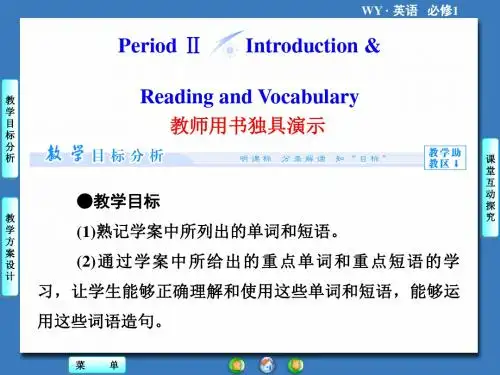
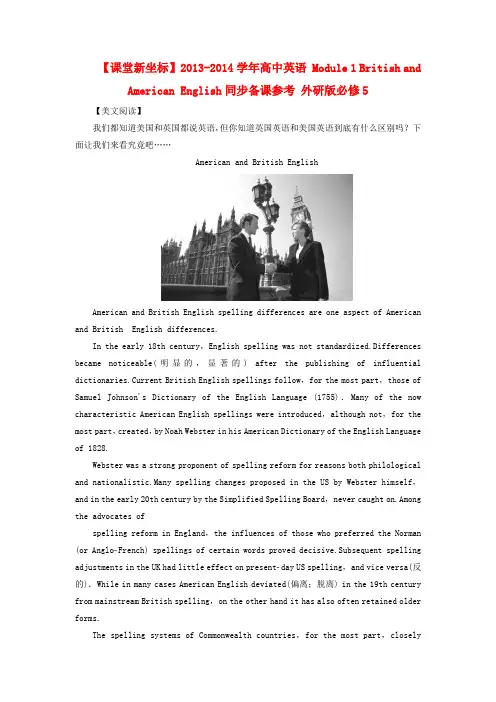
【课堂新坐标】2013-2014学年高中英语 Module 1 British and American English同步备课参考外研版必修5 【美文阅读】我们都知道美国和英国都说英语,但你知道英国英语和美国英语到底有什么区别吗?下面让我们来看究竟吧……American and British EnglishAmerican and British English spelling differences are one aspect of American and British English differences.In the early 18th century,English spelling was not standardized.Differences became noticeable(明显的,显著的) after the publishing of influential dictionaries.Current British English spellings follow,for the most part,those of Samuel Johnson's Dictionary of the English Language (1755).Many of the now characteristic American English spellings were introduced,although not,for the most part,created,by Noah Webster in his American Dictionary of the English Language of 1828.Webster was a strong proponent of spelling reform for reasons both philological and nationalistic.Many spelling changes proposed in the US by Webster himself,and in the early 20th century by the Simplified Spelling Board,never caught on.Among the advocates ofspelling reform in England,the influences of those who preferred the Norman (or AngloFrench) spellings of certain words proved decisive.Subsequent spelling adjustments in the UK had little effect on presentday US spelling,and vice versa(反的).While in many cases American English deviated(偏离;脱离) in the 19th century from mainstream British spelling,on the other hand it has also often retained older forms.The spelling systems of Commonwealth countries,for the most part,closelyresemble the British system.In Canada,however,while most spelling is “British”,many “American” spellings are also used.Additional information on Canadian and Australian spelling is provided throughout the article.【诱思导学】1.What does this passage mainly tell us?【答案】This passage mainly tells us American and British English spelling differences.2.What influenced current British English spelling?【答案】Samuel Johnson's Dictionary of the English Language (1755).3.Did later spelling adj ustments in the UK have influence on presentday words?【答案】No.Period ⅠPreviewing(教师用书独具)●课标技能要求初步掌握本课文中的词汇,浅层次理解课文,了解相关的背景知识。
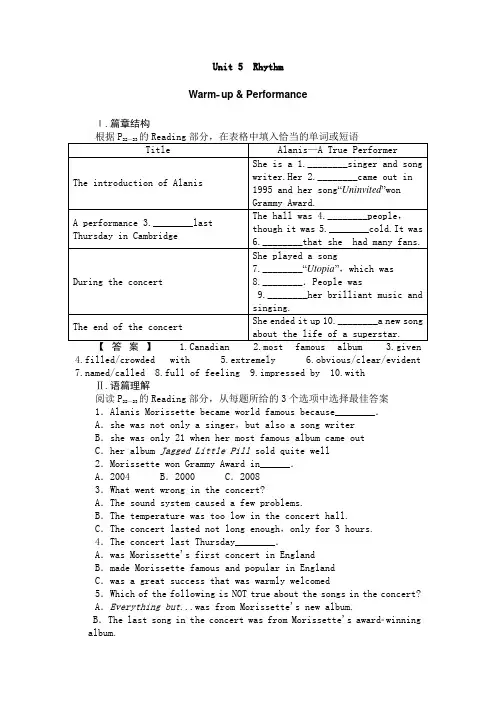
Unit 5 RhythmWarmup & PerformanceⅠ.篇章结构根据P22-23的Reading部分,在表格中填入恰当的单词或短语Title Alanis—A True PerformerThe introduction of Alanis She is a 1.________singer and song writer.Her 2.________came out in 1995 and her song“Uninvited”won Grammy Award.A performance 3.________last Thursday in Cambridge The hall was 4.________people,though it was 5.________cold.It was 6.________that she had many fans.During the concert She played a song7.________“Utopia”,which was8.________.People was9.________her brilliant music and singing.The end of the concert She ended it up 10.________a new song about the life of a superstar.【答案】 1.Canadian 2.most famous album 3.given 4.filled/crowded with 5.extremely 6.obvious/clear/evident d/called 8.full of feeling 9.impressed by 10.withⅡ.语篇理解阅读P22-23的Reading部分,从每题所给的3个选项中选择最佳答案1.Alanis Morissette became world famous because________.A.she was not only a singer,but also a song writerB.she was only 21 when her most famous album came outC.her album Jagged Little Pill sold quite well2.Morissette won Grammy Award in______.A.2004 B.2000 C.20083.What went wrong in the concert?A.The sound system caused a few problems.B.The temperature was too low in the concert hall.C.The concert lasted not long enough,only for 3 hours.4.The concert last Thursday________.A.was Morissette's first concert in EnglandB.made Morissette famous and popular in EnglandC.was a great success that was warmly welcomed5.Which of the following is NOT true about the songs in the concert?A.Everything but...was from Morissette's new album.B.The last song in the concert was from Morissette's awardwinning album.C.There must be many fans singing along to Heartache.【答案】 1.C 2.A 3.A 4.C 5.BⅢ.课文缩写从方框中选择恰当的单词或短语,完成下列短文concert hall;powerful;wellknown;fans;extremely;enjoy;performance;awardwinning;atmosphere;superstarAlanis—a True PerformerLast Thursday night,hundreds of 1.________went to the Corn Exchange in Cambridge to see one of Canada's top singer and songwriters,Alanis Morissette in concert.It was Morisette's first 2.________in England since her song Uninvited won this year's Grammy Award.The 30yearold singer has a strong fan base in England.There was no empty seat in the 3.________at that event,although it was an 4.________cold night.During the 3hour concert,the singer used a lot of material from her 5.________album Jagged Little Pill.She also played a few songs from her new album.Morissette gave a creative and 6.________performance in another song Utopia.Although there were some problems,the audience could still 7.________the concert.Throughout the concert,the 8.________inside the concert hall was exciting.In the end,Morissette showed that she was a true performer, singing a 9.________song of Heartache.While I watched and listened,I knew that I was seeing the performance of a real 10.________.【答案】 1.fans 2.performance 3.concert hall 4.extremely 5.awardwinning 6.powerful7.enjoy8.atmosphere9.wellknown 10.superstarⅠ.词义搭配1.classical A.the act of presenting a play or a piece of music or other entertainment2.effect B.to give,especially as an honor or reward3.disappoint C.widely accepted and used for a long time4.performance D.to fail to meet the hopes or expectations of5.award E.the bottom or lowest part6.base F.to have a great effect on sb.'s mind7.impress G.a change that sb./sth. causes in sb./sth. else,a result 【答案】 1.C 2.G 3.D 4.A 5.B 6.E 7.FⅡ.短语填空be full of;pick up;come out;be used to;add to;be impressed by;well known;as soon as1.That small thing __________ our difficulties.2.We ____________ the pianist's wonderful performance.3.She was ____________ as an excellent dancer.4.He stopped the car to __________ the boy.5.Her mouth opened and shut,but no sound __________.6.The stars came out __________ darkness fell.【答案】 1.added to 2.were impressed by 3.well known 4.pick up 5.came out 6.as soon asⅢ.句型背诵1.Canadian singer and song writer,Alanis Morissette,is_used_to_being in the public eye.加拿大歌手兼歌曲创作者阿兰妮斯·莫里塞特习惯出现在公众的视野中。
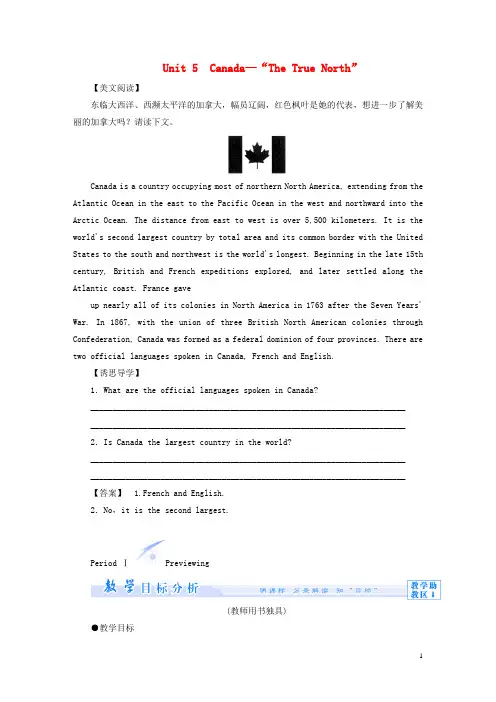
Unit 5 Canada—“The True North”【美文阅读】东临大西洋、西濒太平洋的加拿大,幅员辽阔,红色枫叶是她的代表,想进一步了解美丽的加拿大吗?请读下文。
Canada is a country occupying most of northern North America, extending from the Atlantic Ocean in the east to the Pacific Ocean in the west and northward into the Arctic Ocean. The distance from east to west is over 5,500 kilometers. It is the world's second largest country by total area and its common border with the United States to the south and northwest is the world's longest. Beginning in the late 15th century, British and French expeditions explored, and later settled along the Atlantic coast. France gaveup nearly all of its colonies in North America in 1763 after the Seven Years' War. In 1867, with the union of three British North American colonies through Confederation, Canada was formed as a federal dominion of four provinces. There are two official languages spoken in Canada, French and English.【诱思导学】1.What are the official languages spoken in Canada?________________________________________________________________________ ________________________________________________________________________ 2.Is Canada the largest country in the world?________________________________________________________________________ ________________________________________________________________________ 【答案】 1.French and English.2.No,it is the second largest.Period ⅠPreviewing(教师用书独具)●教学目标本课时主要是通过学生对学案所给出的内容的学习,了解本课文中所出现的词汇,初步了解课文以及相关的背景知识,就下一堂课对课文的全面理解起到一个铺垫作用。
Module 2 A Job Worth Doing【美文阅读】大量的农民Ⅰ进入城市的工厂,成为中国城市和经济发展不可或缺的重要力量。
他们对自己所从事的工作满意吗?下面的文章将为你解读。
A survey was conducted in Shanghai where interviewees were asked if they wanted to be a factory worker, one percent of all people interviewed said “YES,” Wang Hongjun, a technician, said, raising his voice for dramatic(戏剧的;引人注目的) effect.“But I can tell you, only a small part of that one percent are telling the truth.”I've met colorful people like Wang all over China.They are cynical (玩世不恭的) yet warmhearted, plain spoken but smart.And many of them are confined(狭窄的;幽禁的) to work in factories.Wang is a top technician but also represents manual factory workers, who are China's most important natural resource.Their energy is powering China's economic boom(急速发展), and their muscle is turning the wheel of the world's factory.But does their unskilled labor give their life meaning? At school, did they tell their friends:“When I grow up I want to work in a factory making socks?” Did you?Factory work has always been a stepping-stone from farm life to the city and a modern life.It's beenhappening for centuries, but today, with our space-age technology, it's outdated.Earning l,200 yuan($169) per month working in a factory is better than that on a farm, but as Wang points out, it's not a dream career.There should be better ways to earn your rice.Many modern factories no longer have production line workers.Robots do the assembly(装配).People just do the monitoring.In this age of technology, in which China is now working smarter and not just harder, why are people still standing in production lines?But life is cheap in China.So why not continue to exploit(开发,开拓) the low-cost labor situation and keep the economy growing fast, some entrepreneurs(企业家;承包人) may ask.But have these businessmen ever labored in a factory?【诱思导学】1.Do people want to be a factory worker in modern life?【答案】No.They don't.2.How do most China's factory get on with their work?【答案】Manual factory workers do it, who are China's most important natural resource. 3.How do many modern factories get on with their work?【答案】Robots do the assembly(装配) and people just do the monitoring.Period ⅠPreviewing(教师用书独具)●课标技能要求初步掌握本课文中的词汇,浅层次理解课文,了解相关的背景知识。
●教学目标本课时主要是通过学生对学案所给出的内容的学习,了解本课文中所出现的词汇,初步了解课文以及相关的背景知识,对下一堂课对课文的全面理解起到一个铺垫作用。
●教学地位本课介绍不同职业的特征及对人类社会的贡献,培养学生正确的择业观。
运用动词的各种不同时态连贯地表达一定的意思;灵活地综合运用本模块介绍的语言结构;在现有知识和掌握查读、略读等技巧的基础上,分析、理解语言材料,获取所需信息;对中外不同职业进行比较,提高比较、分析、综合和归纳能力。
根据不同职业的要求写招聘广告;根据招聘者提出的条件写求职信。
(教师用书独具)●新课导入建议1.教师:大家请看多媒体大屏幕的几幅做各种工作的图片,现在我们两人为一组来进行讨论:What are the people doing in the photos?学生讨论以后,回答:S1:The doctor is examining the old woman.S2:The manager is talking about the problems with the employees.S3: The electrician is examining the wares.S4:The biochemist is making an experiment.2.教师:大家做的很好,下面请看大屏幕上的一些词汇。
badly paid, dangerous, exciting, intellectual, well paid, manual, satisfying, stressful...请大家用以上的词汇描绘照片上的人所从事的工作。
学生:(讨论后踊跃发言) The manager is intellectual and stressful.The pilot's job is exciting but dangerous.The biochemist is intellectual.The electrician's job is very dangerous.3.教师:I think you must like a certain job best.Now let us discuss in pairs: what sort of job would you like to do?学生:(讨论后用自己的话来回答) I want to do a job which helps other people, such as a doctor.I want to do a job which is very interesting and exciting, such as, a football player.I want to do a job which is a little dangerous, because I like to risk.I like to be a teacher, because I like to stay with children.I like to be a pilot, because I want to fly freely like a bird in the sky.I like to be a biochemist, because I prefer to make experiments.4.教师:大家看一下大屏幕上的这个人在做什么?What do you think the man is doing?学生:(讨论后回答) Maybe the man is directing the traffic.5.教师:请默读课文,验证答案。
学生:读课文,确认答案。
Yes, the man is directing the traffic.6.教师:请大家精读课文,理解课文的细节,回答问题。
(1) Why did the man direct the traffic there?(2) Could he get paid from the job?(3) What made him do the job?学生:默读课文,进行小组讨论,找出问题的答案。
……●教学流程设计导入新课。
→学生阅读“美文阅读”与“诱思导学”(见学案第17页)。
→学生就“话题美文导读”进行讨论,统一答案。
→让学生快速阅读课文(见课本第12-13页),并完成“篇章结构”(见学案第18页)。
→师生共同讨论并统一答案。
→学生再次阅读课文(课本第12-13页)并完成“语篇理解”(见学案第18页)。
→学生共同讨论,并让学生发表各自见解,最后统一答案。
→错误!→老师指导学生讨论,共同找出答案。
→让学生完成“知识初探”部分(见学案第18-19页)。
→学生讨论,并让学生代表发表他们讨论得出的答案。
老师予以更正。
→让学生根据所给出的表格进行自我评估(见学案第19页)。
→错误!(对应学生用书第18页)Ⅰ.篇章结构阅读文章,然后完成下面表格(每空不超过3词)The 1. La Paz is the highest capital in the world and the mountains make 2. difficult.Many roads are in bad condition and accidents are3. .Timoteo Apaza He works as a human traffic 4. .He is a (n) 5. ,no one paying him for his work.The 6.why he does the job Before directing the traffic, he worked as a(n) 7. driver.One day he had a close 8. with death.The experience had a profound 9.on him.He felt it was his 10. to help others.【答案】 1.road munications 3.frequent 4.signal 5.volunteer 6.reason 7.lorry8.encounter9.effect10.missionⅡ.语篇理解阅读P12-13的Reading部分,从每题所给的3个选项中选择最佳答案1.Which is NOT true according to the text?A.Many roads in La Paz are in bad condition.B.There were many accidents in La Paz before.C.In theory the road can be used by traffic all the day.2.How can Timoteo make a living?A.He is paid by the local government.B.He has a lot of money himself.C.He can get tips from some drivers.3.Which job has NOT Timoteo worked as?A.A miner.B.A teacher.C.A lorry driver.4.What does the word “profound” mean in Paragraph 3?A.Great.B.Serious. C.Complete.5.Why is the road going north from La Paz considered the most dangerous one in the world?A.It is in bad condition.B.It rises steeply on one side and has a sheer drop on the other side.C.There is a lot of traffic on the road.【答案】 1.C 2.C 3.B 4.A 5.BⅢ.课文缩写用所给单词或短语的正确形式完成课文缩写survived;thanks to;in particular;dangerous;came off;crashed;effect;in bad condition;take up;signalSituated at 3,500 meters, La Paz is the highest capital in the world.Life and communications are hard there.Many roads are 1. and accidents are frequent.One road 2. is the most dangerous and 46-year-old Timoteo lives in a village near the most 3. part of it.One day he was driving a lorry load of bananas when he 4. the road at a bend.Somehow he 5. it.Then several years later, he was called out in the night to help pull people out of a 6. bus at the Devil's Bend, which had a profound 7. on him.He decided to 8. his place on the bend and direct the traffic.So week in, week out, from dawn to dusk, he stands on the bend, working as a human traffic 9. ,holding a large circular board, one side of which is red and the other side green.10.Timoteo, the death toll has fallen.【答案】 1.in bad condition 2.in particular 3.dangerous 4.came off 5.survived 6.crashed7.effect8.take up9.signal10.Thanks toⅠ.词义搭配1.satisfying A.a person who offers to do something without being paid2.electrician B.to meet by chance; to find oneself faced by something difficult3.volunteer C.very steep4.sheer D.a person whose job is to connect, repair, etc.electrical equipment5.respect E.giving satisfaction6.toll F.shaped like a circle;round7.circular G.to have a high opinion of something or somebody8.encounter H.the total number of being killed9.profound I.task;duty;responsibility10.mission J.very great; felt or experienced verystrongly【答案】 1.E 2.D 3.A 4.C 5.G 6.H7.F8.B9.J10.IⅡ.短语填空in good condition;in particular;on (the) average; in theory;in practice;take sth.for granted;have an effect on;take up1.He spends two hours a day in reading.2.It sounded like a good idea, but it didn't work.3.China's improvements are starting to climate models.4.Is my equipment ?Can I land safely?5.Many retired people gardening as a hobby.6.There are many things I and don't even realize.7.She likes fruit and tomatoes .8.Your plan sounds fine ,but will it work?【答案】 1.on the average 2.in practice 3.have an effect on 4.in good condition 5.take up 6.take for granted7.in particular8.in theoryⅢ.句型背诵1.One road in particular,which goes north from La Paz,is considered the most dangerous road in the world.尤其是从拉巴斯通往北边的一条路被认为是世界上最危险的路。